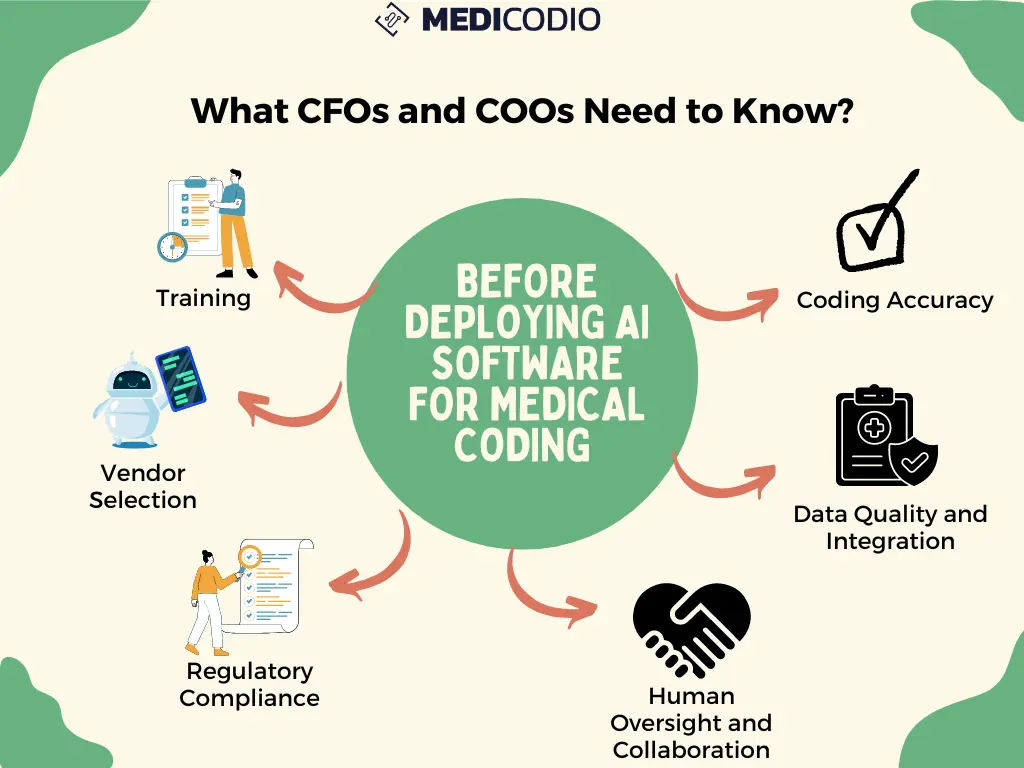In the rapidly evolving landscape of healthcare, the integration of AI has become more prevalent than ever. Among the significant areas where AI is making remarkable strides is medical coding. CIOs, CFOs, and COOs in Revenue Cycle Management (RCM) companies and healthcare facilities are presented with an array of opportunities and challenges when considering the utilization of AI in medical coding. This article aims to provide an in-depth understanding of the key aspects every COO should be aware of before embracing AI-driven software for medical coding.
The world of medical coding is evolving faster than you can say “ICD-10.”
To start with, the medical coding field is experiencing a huge growth in the skill gap. As healthcare systems become more complex and reliant on accurate coding for billing and reimbursement, the demand for skilled medical coders is escalating. However, the available workforce often lacks the necessary proficiency to navigate intricate coding systems, keep up with evolving regulations, and ensure precision in translating medical procedures and diagnoses. Bridging this skill gap is essential to maintain the integrity of healthcare data and support efficient healthcare operations.
Most of the medical coding teams are understaffed. They are struggling to keep up with the high volume of patient and evolving coding guidelines. In addition, physicians, whose primary focus should be patient care rather than coding, are also experiencing the weight of having to rectify coding mistakes.
Even outsourcing medical coding has its own set of limitations and issues. One of the major problems is that most outsourcing companies still follow manual medical coding approach. Unsurprisingly, this approach has resulted in higher rates of coding errors, subsequently leading to an increase in claim denials and billing delays.
What’s the way forward for CFOs and COOs?
The answer is automation, powered by Artificial intelligence (AI).
Starting from reading patient charts to code search and sharing it with billing team, the complete process can be automated using AI-powered medical coding assistant.
With the help of AI, CFOs and COOs can enhance coding accuracy of their team and streamline the revenue cycle process. This reduces workload for medical coders, removes burdens from doctors, and helps COOs and CFOs reduce costs, prevent revenue loss, and decrease claim denials.
Understanding AI-Powered Software for Medical Coding
AI-powered software for medical coding is revolutionizing the healthcare industry by automating and streamlining the complex process of assigning standardized codes to medical diagnoses and procedures. This software leverages advanced algorithms, machine learning, and natural language processing to analyze clinical documentation and accurately assign the appropriate codes. The software’s ability to process vast amounts of data with speed and precision presents a transformative potential for COOs looking to enhance operational efficiency and accuracy.
Benefits of AI Software for Medical Coding
-
- Enhanced Accuracy and Efficiency: AI-driven coding software reduces the risk of human errors that can lead to claim denials and revenue loss. It significantly improves coding accuracy, ensuring compliance with regulatory standards.
- Time-Saving: Traditional manual coding can be time-consuming and labor-intensive. AI automates this process, allowing medical coders to focus on more intricate cases that require human expertise.
- Scalability: As healthcare facilities expand, the volume of patient data and coding tasks increases. AI software can seamlessly scale to handle larger workloads without compromising accuracy.
- Real-Time Insights: AI-powered software for medical coding provides real-time analytics and reporting, offering COOs valuable insights into coding trends, operational performance, and revenue projections.
Despite such valuable benefits, COOs and CFOs are still hesitant to adopt AI medical coding tool. To Find out why: Click Here!
Key Considerations Before Implementation
1. Data Quality and Integration
Successful implementation of AI in medical coding relies heavily on the quality and integration of data. COOs must ensure that their existing electronic health record (EHR) systems are robust enough to handle the integration of AI software. Clean, structured, and comprehensive data sets are vital for accurate coding outcomes.
2. Human Oversight and Collaboration
While AI is exceptionally powerful, human oversight remains crucial. COOs should establish a collaborative environment where medical coders and AI software work in tandem. This ensures that the software learns from expert coders and continuously improves its accuracy.
3. Regulatory Compliance
Healthcare coding is subject to rigorous regulations, including ICD-10 and CPT coding standards. AI software must align with these standards to prevent compliance issues and financial penalties. CFOs and COOs must verify that the software vendor has incorporated these standards into the algorithms.
4. Vendor Selection
Choosing the right AI software vendor is pivotal. COOs should thoroughly research and evaluate vendors based on their track record, reputation, customer reviews, and the comprehensiveness of their coding solution.
5. Training and Adaptation Period
It’s important to recognize that AI software requires a period of adaptation. Medical coders and staff need proper training to effectively utilize the software’s features. COOs should allocate resources and time for this training phase.
6.Coding Accuracy
Accurate medical coding is crucial due to varying payer and state regulations. Discrepancies can arise in coding for procedures. Aligning ICD and CPT codes is vital for prompt reimbursements, preventing revenue disruptions caused by code errors or denials.
Also learn what are the common medical coding mistakes to avoid for accurate reimbursement.
Future Outlook and Conclusion
The integration of AI-powered software for medical coding is reshaping the way healthcare facilities manage their revenue cycle operations. COOs who recognize the potential of AI and invest in robust, compliant, and well-integrated systems are likely to experience improved coding accuracy, operational efficiency, and overall financial performance.
In conclusion, the adoption of AI in medical coding is not just a technological advancement; it’s a strategic move that can lead to enhanced patient care, streamlined workflows, and sustainable growth. By staying informed about the considerations mentioned in this article, COOs can confidently navigate the dynamic landscape of AI-driven healthcare.





